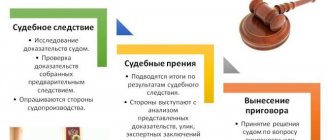Last updated March 2021
In 2021, a chapter numbered 15.2 appeared in the Criminal Code of the Russian Federation, which provides for the opportunity to avoid punishment for a crime under certain conditions, “getting off” with a court fine. Chapter 51.1 introduced into the Code of Criminal Procedure of the Russian Federation is intended to regulate the procedure for his appointment.
This innovation demonstrates the desire of legislative bodies to distinguish the consequences of an act depending on as many factors as possible, the main of which is the person’s personality.
Judicial fine - what is it?
Chapter 15.2 was included in the section regulating the application of other criminal measures to those who have broken the law, along with confiscation of property and compulsory medical measures.
This is not a punishment for a crime, but a kind of measure of influence without assigning it to the person held accountable.
Art. 104.4 of the Criminal Code of the Russian Federation establishes that a judicial fine is a monetary penalty imposed when a person is released from criminal liability by the court in accordance with certain grounds
In other words, a person, instead of being convicted, found guilty, sentenced to serve a deserved sentence and subsequently have a criminal record, is released by the court from liability and pays only a certain amount of money to the state. The criminal case/prosecution is terminated under Art. 25.1 of the Code of Criminal Procedure of the Russian Federation, which regulates the grounds and general procedure in this case.
A judicial fine is not a fine as a type of criminal punishment for an offense committed by a judge; it will not lead to a criminal record.
Business and finance
Business
BanksWealth and welfareCorruption (Crime)MarketingManagementInvestmentSecuritiesManagementOpen joint-stock companiesProjectsDocumentsSecurities - controlSecurities - valuationsBondsDebtCurrencyReal estate (Rent)ProfessionsWorkTradeServicesFinanceInsuranceBudgetFinancial servicesCreditsCompaniesState-owned enterprisesEconomyMacroeconomicsMi
Industry
MetallurgyOilAgricultureEnergy
Construction
ArchitectureInteriorFloors and ceilingsConstruction processBuilding materialsThermal insulationExterior
When is a court fine possible?
The conditions for imposing a judicial fine are prescribed in Art. 76.2 of the Criminal Code of the Russian Federation, its appointment is possible only if all the stipulated points are fulfilled:
- Crime committed for the first time. A person will be considered to have committed a crime for the first time under certain conditions:
- He committed one or more illegal acts, but was never convicted of any of them.
- He was released from criminal liability or was not brought to it.
- The sentence for a previously committed crime has not yet entered into legal force at the time the new one was committed.
- The existing sentence has entered into force, but grounds have emerged for canceling the negative consequences of prosecution (the criminal record was cleared, the deadline for its expungement came, the person was released from serving the sentence due to the expiration of the statute of limitations for the execution of this sentence).
- The previously passed sentence came into force, but by the date the case was considered by the court, the act for which the person was convicted ceased to be considered a crime. This means that changes have been made to the Criminal Code of the Russian Federation, according to which the article imputed upon conviction is decriminalized. So, previously theft in accordance with Part 1 of Art. 158 of the Criminal Code, theft of more than 1 thousand rubles was considered, and from mid-2016 - over 2.5 thousand rubles. Consequently, with the changes, theft of property worth from 0 to 2499 rubles. becomes petty theft and is subject to administrative liability, not criminal liability.
- The crime committed is of minor (provided punishment - no more than 3 years of imprisonment) or medium (up to 5 years for intent and up to 10 years for careless form of guilt) gravity.
- The damage caused by the crime is compensated or the harm from it is made up for in some other way . Damage is damage to property that can be compensated in kind (repair, replacement of lost property, etc.) or in monetary terms. Making amends is financial compensation for moral damage, any assistance to the victim of a crime, etc. Damage and harm can be compensated and made amends not only by the guilty person, but also by other people at his request or with his consent. Promises and other verbal undertakings on the part of the accused to do this in the future are not accepted by the court.
What to do if there is no victim in the case and no one to apologize to?
Release is possible even if there is no victim in the case and there is no damage or other harm as a mandatory sign of the objective side of the crime (crime with a formal element).
Of course, this does not mean that the commission of this crime does not entail harm or a real threat of causing it.
For example, during the inspection of the premises, the suspect actively helped identify hiding places, pointing out items prohibited from circulation; this can be presented as making amends for the harm.
A person may be released from criminal liability with a court fine even in the case where, as a result of the commission of a crime, material damage was not actually caused due to the fact that the crime was not completed due to circumstances beyond the control of this person, that is, there was an attempt to commit crimes.
It should also be noted that the commission by a person for the first time of several crimes of minor and (or) medium gravity does not prevent him from being released from criminal liability with the imposition of a court fine.
Amount and deadline for payment of the court fine
The law does not establish a specific amount of a court fine. There are general theses regarding its definition, prescribed in Art. 104.5 of the Criminal Code of the Russian Federation.
The amount of payment is determined by the court and is affected by:
- the severity of the crime charged;
- the financial situation of the person whom the court exempts from liability;
- the possibility or ability of him to receive any income;
- the financial status of his family.
Part one of Art. 104.5 establishes only the limits within which this fine can be imposed:
- no more than ½ the maximum amount of the fine under the charged article;
- if this type of punishment (fine) is not provided for in the article - no more than a quarter of a million rubles.
Considering the fact that a court fine is another measure of a criminal law nature, the provisions on the appointment and execution of a fine-punishment under Art. 46 of the Criminal Code of the Russian Federation are not applicable to him.
The period for payment of a court fine is also determined by the court individually and can vary significantly based on financial situation and other circumstances.
Vera Viktorovna Dolganina
Practicing lawyer with more than 10 years of experience.
Ask a Question
When determining the amount of a court fine for each individual person, the court is obliged to cite the circumstances it took into account in the final decision. This also applies to establishing deadlines for paying a fine: they must be justified by facts supported by documents in the case materials.
The procedure for imposing a court fine in a criminal case
If the conditions referred to in Art. 104.4 of the Criminal Code of the Russian Federation are complied with, and a procedure is initiated for the court to consider the possibility of imposing a judicial fine. The process takes place in two very similar versions; which of them is applicable depends on the stage of the proceedings.
Termination of a criminal case/prosecution with the imposition of a judicial fine is permissible at any time, but only before the presiding judge retires to the deliberation room to pronounce a verdict (the last one before this stage is the last word of the defendant, if he decides to exercise this right).
Pre-trial investigation
Until the moment when a criminal case is sent to court for consideration, the initiative to begin the process of terminating the case with the imposition of a court fine comes from the person investigating it. The procedure in this case is regulated by Art. 446.2 of the Code of Criminal Procedure of the Russian Federation.
If during the investigation of a criminal case the grounds specified in Art. 25.1 of the Code of Criminal Procedure of the Russian Federation, the person who is investigating it makes a decision to initiate an appropriate petition for each specific suspect or accused individually.
This request of the investigator must be agreed upon with his immediate supervisor, and that of the interrogating officer with the prosecutor. A copy must be provided to the victim.
The petition is prepared by the investigator and sent to the court along with all the case materials and details for transferring funds. It is considered by a single judge, whose competence includes the consideration of a criminal case. For example, cases of “simple” thefts under Part 1 of Art. 158 of the Criminal Code of the Russian Federation are subject to the jurisdiction of magistrate judges, and those qualified under Parts 2-4 of this article are subject to the jurisdiction of district judges. Accordingly, the question of application of Art. 25.1 of the Code of Criminal Procedure will be decided by the same judges.
The process must take place no later than 10 days from the date of receipt of the application.
The judge presiding over the trial has the powers:
- Satisfy the petition, terminate the case on the basis of Art. 25.1 of the Code of Criminal Procedure of the Russian Federation with the imposition of a judicial fine. This decision is made under the following conditions:
- the suspect/accused has no objections to the termination of the case on this basis;
- the circumstances of participation in the crime specified in the petition are similar to those revealed at the court hearing;
- there are no other reasons to terminate the proceedings (for example, due to the absence of elements or events of the crime, the expiration of the statute of limitations)
- Refuse the request, return it and the corresponding case to the investigative body or prosecutor. Such a decision may follow in the following cases:
- information about a person’s participation in the crime described in the petition does not correspond to the circumstances clarified at the meeting to consider it;
- the criminal case/prosecution must be terminated on other grounds provided by law;
- the suspect/accused does not agree with the termination of the case under Art. 25.1 Code of Criminal Procedure of the Russian Federation.
The consent of the accused to terminate the criminal case with the imposition of a court fine is required, since this basis is not rehabilitative. That is, it does not exclude a person’s involvement in a crime; he is subsequently considered to have been prosecuted, but not convicted.
Any provisions regarding the mandatory consent of the victim to terminate the proceedings in accordance with Art. 25.1 of the Code of Criminal Procedure of the Russian Federation is not contained in the law. However, the court still asks for his opinion on this matter in the trial. The decision made is formalized in the form of a resolution.
Appealing a decision on a petition
The court's decision based on the results of consideration of the investigator/inquiry officer's petition to terminate the case with the imposition of a judicial fine can be appealed on appeal (Part 7 of Article 446.2, Chapter 45.1 of the Code of Criminal Procedure of the Russian Federation). For example, the refusal to satisfy such a request can be appealed by the suspect/accused or their defense attorneys (Article 389.1 of the Code of Criminal Procedure of the Russian Federation).
Stage of proceedings in court
According to Part 1 of Art. 25.1 of the Code of Criminal Procedure of the Russian Federation, the possibility of termination of a criminal case/prosecution with the imposition of a court fine exists, even when the criminal case is already being considered in court. The procedure for making a decision in this case is regulated by Art. 446.3 Code of Criminal Procedure of the Russian Federation.
Vera Viktorovna Dolganina
Practicing lawyer with more than 10 years of experience.
Ask a Question
This procedure looks a little simpler than the previous one and consists in the fact that the court, when considering a criminal case, has established the grounds for dismissing the case under Art. 25.1 of the Code of Criminal Procedure of the Russian Federation independently issues a ruling or resolution to terminate it and assign a court fine to the defendant. In practice, this means that in this case no one's application is required to make a decision.
The requirements and grounds for these procedural decisions and documents are similar to those described above.
The court must explain in writing what will happen if the court fine is not paid, as well as the need to transfer to the bailiff information about the payment of the fine, supported by payment documents.
Another way to start the procedure for imposing a court fine
According to Part 2 of Art. 446.2 of the Code of Criminal Procedure of the Russian Federation, before going to court with a petition to dismiss the case with the imposition of a judicial fine, the investigator or inquiry officer must establish the circumstances necessary for this, described above. Art. 446.3 of the Code of Criminal Procedure of the Russian Federation instructs the court to similarly establish these circumstances , only after this it has the right to resolve the issue of imposing a judicial fine.
There are situations in which a petition is not prepared and the issue of a court fine is not resolved; such cases have their own solution:
- The investigator/inquiry officer or the court during the investigation or judicial review for some reason did not establish the necessary conditions for imposing a judicial fine. In this case, it is necessary to apply for investigative actions and other measures, to include information and evidence to confirm the existence of these conditions. They may be different in each individual situation. For example, about interrogating the victim in order to clarify the issue of compensation for damage, attaching his receipt, requesting information about prosecution, additional information, and others.
- The investigator/inquiry officer or the court has established these circumstances, but for some reason does not consider the issue of terminating the case and imposing a court fine. In this case, the suspect/accused and/or their defenders have the right to prepare a petition to apply this measure of a criminal law nature. To make a decision on imposing a judicial fine, a petition is not mandatory, but may prompt authorized persons to consider the issue.
Petition to terminate the criminal case with the imposition of a court fine
Application, consideration and appeal of decisions on petitions
The petitions discussed above are indicated in the text of Chapter 15 of the Code of Criminal Procedure of the Russian Federation. Their consideration is mandatory for both the investigative authorities and the court. The results of the consideration (full or partial refusal of satisfaction, satisfaction) are formalized by a resolution (at the investigation stage) or a ruling (at the stage of consideration of the case in court).
Any of these documents must contain the reasons for the decision made. The maximum period for making a decision is three days from the date of the application.
Each of the decisions made, if you disagree with it, can be appealed in accordance with the procedure established by law:
- The decision at the request of the investigator - to a senior manager, the prosecutor or to the court, the decision of the investigator - to the prosecutor or to the court in accordance with Art. Art. 124, 125 Code of Criminal Procedure of the Russian Federation.
- The court decision on such petitions is appealed on appeal (Part 2 of Article 389.2 of the Code of Criminal Procedure of the Russian Federation), but only together with the final decision in the case (sentence or resolution).
In any case, the decision of the authorized person on the petition will make clear the position of the investigative body or the court and the reasons why the issue of applying a judicial fine, in their opinion, is subject to consideration or not.
TERMINATION OF A FORMAL CRIMINAL CASE
The magistrate judge of judicial district No. 106 of the Central district of Sochi, by his resolution dated 08/03/2016, terminated criminal case No. 1–13/2016 against Sh., who was accused of committing a crime under Art. 322.3 of the Criminal Code of the Russian Federation “Fictitious registration of a foreign citizen or stateless person at the place of stay in residential premises in the Russian Federation”, with reference to Art. 25.1 of the Code of Criminal Procedure of the Russian Federation and imposed a court fine in the amount of 20 thousand rubles. The magistrate motivated the decision by the fact that the defendant had committed a crime of minor gravity for the first time, had not caused any damage by the crime, had repented of her crime, and had a positive character at her place of residence. Thus, the magistrate dismissed the case in which the accused did not compensate for the damage or did not make amends for the harm caused by the crime in any other way and could not do this in principle. At the same time, in Art. 25.1 of the Code of Criminal Procedure of the Russian Federation provides for the positive behavior of a person after committing a crime as a basis for termination of a case, which should be expressed in compensation for damage or making amends for the harm caused by the crime in another way, which would indicate a decrease in the degree of social danger of the person.
The Criminal Code of the Russian Federation contains a significant number of formal crimes of minor and medium gravity, which do not provide for the occurrence of socially dangerous consequences in the form of property or non-property harm to individuals or legal entities. There are no victims in such cases. In this regard, the question arises about the possibility of terminating the case with the imposition of a judicial fine against the persons who committed such crimes. Since compensation for damage (and not its absence) is provided for in Art. 25.1 of the Code of Criminal Procedure of the Russian Federation as a basis for making a decision to terminate, the court does not have the right to terminate the case with the imposition of a judicial fine for crimes with a formal composition. Undoubtedly, the judge who made this decision was guided by considerations of humanity. He believed that in the absence of damage from the crime, if the accused is positively characterized, admits guilt and repents, then he can be released from criminal liability and not be labeled with a criminal record. However, these considerations do not fit within the strictly defined framework of the law and confront the judge with a difficult choice between expediency and legality, which the judge must make in favor of legality.
How does execution happen?
The decision to terminate a criminal case and impose a court fine is enforced by the court that issued it in accordance with the established procedure. Its copy and the writ of execution are sent to the territorial division of the Federal Bailiff Service in the debtor’s area of residence.
Bailiffs in this situation are guided by Art. 103.1 Federal Law “On Enforcement Proceedings”.
A court fine must be executed by the person to whom it is assigned; the bailiff only controls this process.
Unlike the usual procedure for material penalties, a deadline for voluntary payment is not set, and an enforcement fee is not collected.
Enforcement proceedings may end:
- full payment of the assigned amount;
- return of the writ of execution at the request of the court;
- a motion to cancel a court fine if it is not paid.
The last of the above grounds for ending the proceedings with the bailiff becomes possible if he does not have information that the court fine was paid 10 days (including weekends and holidays) from the date of completion of the period allotted for payment.
If non-payment occurs for unjustifiable reasons, the person is considered to be evading it.
Reasons that arose after the court’s decision and impeded the ability to pay the court fine may be valid. In particular, this may be an illness and treatment in a hospital setting, loss of a job, loss of other income, property, etc.
Payment terms
The timing of payment depends on the court decision.
The court may make a decision as follows:
- payment of a fine without installment payment;
- providing payment in installments.
If the judge does not allow the convicted person to pay the fine in installments, then 30 days are allotted for payment from the date the decision enters into force. But if the culprit is not able to fully pay the entire amount, then he can apply for an installment plan. In this case, he must pay the main part of the amount for a period of no more than 30 days, and pay the remaining amount monthly. The duration of the installment plan should not exceed 3 years.
The installment plan period granted by the court must be no more than 5 years. In the decision, the judge indicates the timing and amount of payment.
The bailiff must carry out the judge's decision and ensure compliance with the terms of payment of the debt in the case. Based on the court's verdict, it issues a decision to initiate proceedings or to refuse. The process of collecting a fine is regulated by Art. 103 Federal Law (Federal Law) “On Enforcement Proceedings”. It is necessary to inform the debtor that failure to pay on time is considered malicious evasion.
If payment is late, it is possible to replace the punishment with another, usually more serious one (Article 46, Part 5 of the Criminal Code of the Russian Federation).
The change of punishment is carried out by the court. If a fine is applied as an additional penalty, then the bailiff may forcefully collect the debt. If the location of the evader is unknown, then he is put on the wanted list. If the culprit manages to hide for a long time, then the criminal prosecution may be terminated due to the expiration of the statute of limitations.
After the debt is paid in full, the bailiff issues a ruling to complete the enforcement proceedings. You can check your debt through online services.
Consequences if the court fine is not paid
In a situation where, 10 days from the last day of the period set by the court, the court fine is not paid, the court will cancel the decision to terminate the criminal case. This process is initiated by the bailiff by sending a reasoned submission to the court.
After the decision is cancelled, the case materials are returned to the investigative body or the prosecutor (if the case was investigated by an investigator), subsequently it is investigated in the usual manner - until a verdict or other final decision is made.
Payment Methods
To pay the fine, bailiffs issue the defendant with the necessary package of documents: writ of execution, receipts, details (recipient’s tax identification number, recipient’s account number, BIC, UIN and UIP).
The court also regulates the amount of regular payments and the terms of payment.
Using the available details, payment can be made in several ways:
- at a branch of any bank;
- through an ATM;
- through your personal account at the bank;
- Online .
After each payment, be sure to save all receipts and checks.
In case of actual payment, they will be issued by the operator in person; in case of virtual payment, they will be sent by email or to the user’s profile in the system.
Judicial fine and fine as punishment
There is some similarity between these two concepts in the Criminal Code of the Russian Federation, which often becomes the cause of confusion, primarily among those held accountable. Probably the new measure should have been called differently to avoid confusion of concepts. But to some extent, this established name reflects its essence. The table below will help you understand the distinctive features and advantages of a court fine.
| Judicial fine | Fine | |
| Provided | Art. 104.4 of the Criminal Code of the Russian Federation | Art. 46 of the Criminal Code of the Russian Federation |
| Consequences | termination of the case, release from liability, payment of a certain amount of money | recognition of guilt, conviction, payment of an assigned fine, criminal record (expired one year from the date of payment) |
| The court issues | resolution | sentence |
| Size | determined by the court, but cannot be more than 1/2 of the maximum fine under the relevant article of the Criminal Code of the Russian Federation, if the fine is not provided for in the article - no more than 250 thousand rubles. | from 5 thousand to 5 million rubles. or in the amount of the perpetrator’s earnings for a period from 2 weeks to 5 years |
| Appointed | according to the rules established by Chapter 15.2 of the Criminal Code and 51.1 of the Code of Criminal Procedure | in each specific case - under the sanction of the imputed article |
| Consequences of non-payment | criminal prosecution, consideration of the case in the usual manner, sentencing, imposition of punishment, serving it, criminal record | replaced by another punishment |
| Payment deadline | established by the court | 60 days after the verdict comes into force, installments for up to 5 years are possible |
As another measure of a criminal legal nature
This definition refers to measures taken by the state against violators of the law that do not fall under the category of punishment. This is a certain type of response to crime.
A judicial fine has the following features of this group of criminal legal measures:
- the fine, like other measures in the designated group, is imposed solely by court decision;
This is explained by the fact that two decisions come into force at the same time: the abolition of criminal punishment and the imposition of a court fine.
the fine does not in any way limit the defendant’s rights and freedoms. A person can function normally in society, only if he fulfills the obligation imposed on him;
the meaning of fines is not only to restore justice, but also to provide private re-education and compensation for possible damage to the injured party;
a fine may be imposed on a third party who is not involved in the commission of the crime, but is responsible for the offender.
Application problems
Despite the fact that the opportunity to avoid liability by paying a certain amount of money, called a court fine, exists for a fairly long period, some uncertainties remain. Among them are the following:
- The most unclear provisions in the law relate to the uncertainty in establishing the amounts and timing of payment. Only the maximum size is regulated; no minimum is specified at the legislative level. There is also no clarification regarding the deadline.
- The next difficulty is the possibility of avoiding punishment for persons who have committed acts dangerous to society. Their correction without the use of punitive measures raises reasonable doubts. The Criminal Code of the Russian Federation includes a significant number of acts, after the commission of which (subject to a number of requirements) it is possible to avoid real punishment. For example, crimes such as “Force to perform acts of a sexual nature” (Part 1 of Article 133), involvement or organization of prostitution (Article 240, Article 241), “Receiving sexual services of a minor” (Article 240.1) and many other.
- Next, the question arises whether such termination is possible in cases in which one of the conditions cannot be met: absence of damage or inability to make amends. For example, this is illegal trafficking in weapons (Article 222 and others), drugs (Article 228), porn materials (Article 242), forgery of documents (Article 327), cruelty to animals (Article 245), etc.





